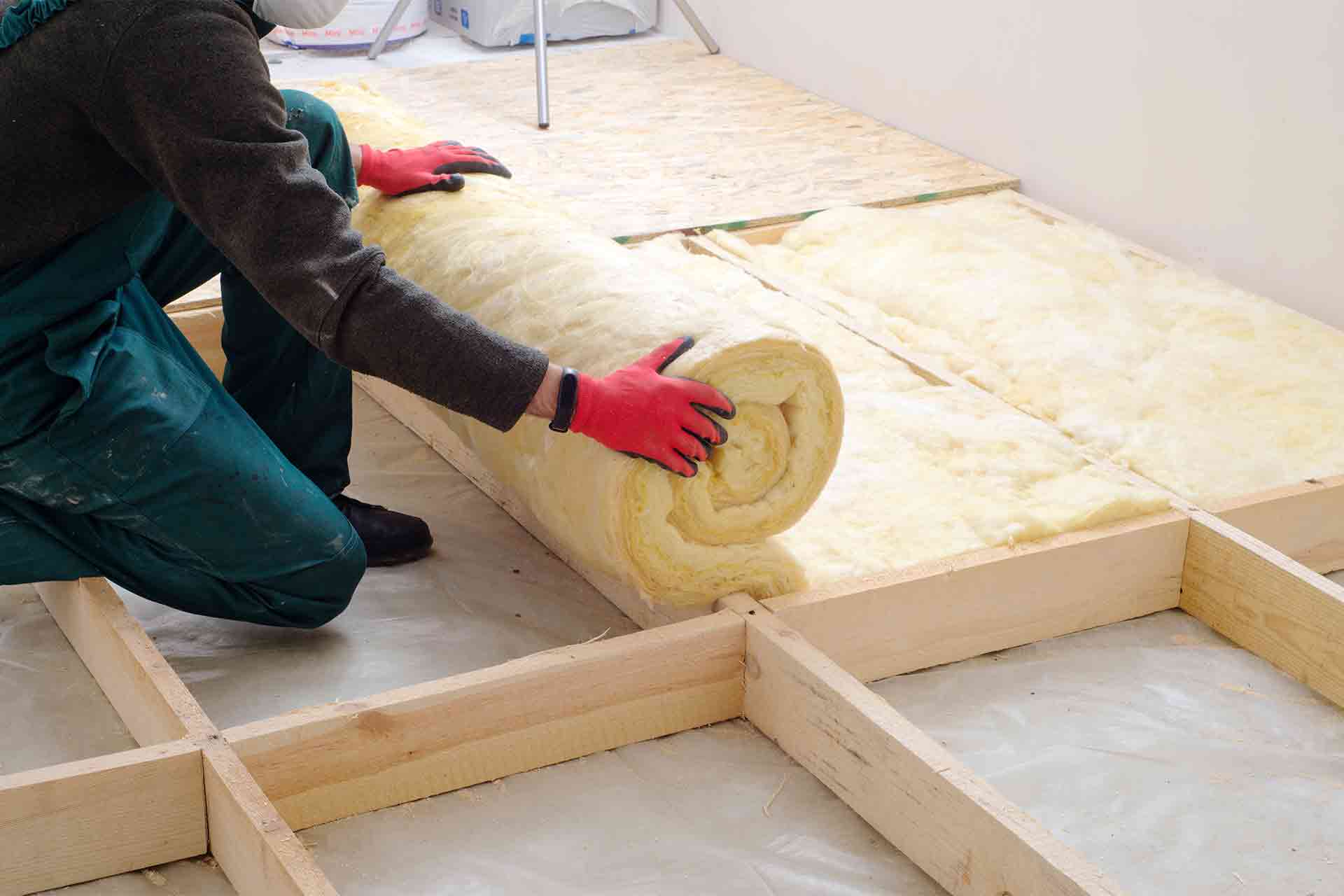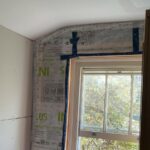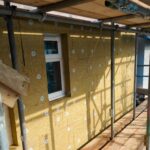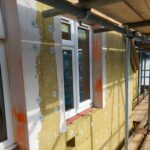In GFI, Ground Floor Insulation by Robert Wheeler / 23 January 2024 / 0 comments

When it comes to the insulation of our homes, the focus is often on walls, roofs, and windows. However, one crucial area that deserves equal attention is the ground floor. Insulating the ground floor can bring about numerous benefits, from improved energy efficiency and enhanced thermal comfort to moisture control and noise reduction.
In this blog post, we will explore the reasons why insulating the ground floor is worth considering. We will delve into the potential cost savings, the impact on indoor comfort levels, the prevention of rising damp, noise reduction, environmental considerations, available insulation options, and the financial investment required. By the end, you will have a comprehensive understanding of the importance and potential advantages of insulating your ground floor.
Introduction: Understanding the Importance of Ground Floor Insulation
The role of insulation in maintaining a comfortable indoor environment
When it comes to creating a cosy and comfortable living space, insulation plays a crucial role. Insulating your home helps in controlling the temperature, keeping it warm during the winter and cool in the summer. But have you ever wondered about the importance of insulating the ground floor? Let’s dive in and find out!
Factors to consider when assessing the need for ground floor insulation
Insulating the ground floor might not be the first thing that comes to mind when considering home improvement projects, but it shouldn’t be overlooked. Several factors can influence the need for ground floor insulation, such as the type of flooring, the age of the property, and the level of insulation in other areas of the house. Assessing these factors will help you determine whether insulating the ground floor is worth your time and investment.
Energy Efficiency Benefits: Exploring the Potential Cost Savings
How ground floor insulation contributes to energy conservation
One of the significant benefits of ground floor insulation is its contribution to energy conservation. Insulating the ground floor helps to prevent heat loss through the floor, reducing the amount of energy needed to keep your home warm. This means your heating system won’t have to work as hard, resulting in lower energy bills and a reduced carbon footprint.
Estimating potential cost savings through proper insulation
Curious about how much you could save? Well, the potential cost savings from ground floor insulation can be substantial. According to experts, insulating the ground floor can save you up to 15% on your energy bills. With those extra savings, you could treat yourself to a fancy coffee every day or even splurge on that long-awaited vacation.
Comfort and Thermal Performance: Enhancing Indoor Comfort Levels
Impact of ground floor insulation on maintaining optimal temperatures
Nobody wants to have freezing toes or feel like they’re walking on an ice rink when they step on their ground floor. Insulating the ground floor can make a significant difference in maintaining optimal temperatures throughout your home. It helps to prevent heat loss, creating a cozy and comfortable living environment all year round.
Reducing draughts and cold spots with effective insulation
Say goodbye to those pesky draughts that make you reach for an extra sweater! Effective ground floor insulation not only helps in maintaining a consistent temperature but also reduces draughts and cold spots in your home. With proper insulation, you can finally enjoy every corner of your living space without feeling like you’re braving the elements.
Moisture Control and Damp Prevention: Protecting against Rising Damp
Understanding the risks of rising damp on ground floors
Rising damp is a homeowner’s nightmare. It occurs when moisture from the ground seeps into the walls and floors, leading to unsightly damp patches, mold growth, and even structural damage. Ground floors are particularly susceptible to rising damp due to their proximity to the ground. Insulating the ground floor can act as a barrier, protecting your home against the risks of rising damp.
How insulation can act as a moisture barrier and prevent dampness
Insulation not only helps with temperature control but also acts as a moisture barrier. By insulating the ground floor, you create a protective layer that stops moisture from seeping into your living space. This prevents dampness, mold growth, and potential damage to your property. So, not only will you have a cozy home, but you’ll also avoid any unwelcome surprises caused by rising damp.
So, is it worth insulating your ground floor? Absolutely! From energy efficiency benefits and enhanced comfort to moisture control and damp prevention, ground floor insulation offers a range of advantages that can make a real difference in your home. Don’t let your ground floor feel left out in the cold – insulate it and create a warm and welcoming space for all to enjoy!
Noise Reduction: Minimizing Impact from External Noise
The role of insulation in reducing noise transmission through the ground
If you’ve ever tried to enjoy a peaceful day at home only to be interrupted by the sounds of traffic or rowdy neighbors, you’ll understand the importance of noise reduction. Insulating your ground floor can help minimize the impact of external noise, creating a more serene and tranquil environment indoors. By installing insulation, you create a barrier that blocks sound waves from easily traveling through the ground and into your home. So, say goodbye to those unwanted disturbances and hello to some much-needed peace and quiet!
Improving soundproofing for enhanced peace and quiet indoors
Insulating your ground floor not only reduces noise transmission from outside but also improves soundproofing within your home. This means that you can enjoy a movie night without disturbing the neighbors, or have a conversation without being interrupted by the sound of footsteps from upstairs. Better soundproofing can make a big difference in your overall quality of life, allowing you to relax and enjoy your space without the constant intrusion of unwanted noise.
Environmental Considerations: Contributing to Sustainability Efforts
Exploring the environmental benefits of ground floor insulation
Insulating your ground floor doesn’t just benefit you, it also contributes to sustainability efforts. By improving the energy efficiency of your home, you reduce the amount of heat and energy that is wasted. This means less reliance on fossil fuels and a smaller carbon footprint. So, by insulating your ground floor, you are not only creating a more comfortable living environment but also doing your part to protect the planet.
Sustainable insulation materials and their impact on the environment
When considering ground floor insulation options, it’s important to choose sustainable materials that have a minimal impact on the environment. Luckily, there are plenty of eco-friendly insulation options available today. From recycled materials to natural fibers, these sustainable choices not only provide effective insulation but also minimize the use of harmful chemicals and reduce waste. So, you can insulate your ground floor with the peace of mind that you’re making an environmentally conscious decision.
Types of Ground Floor Insulation: Evaluating Available Options
Different types of insulation suitable for ground floors
When it comes to ground floor insulation, you have several options to choose from. The most common types include foam insulation, fiberglass batts, and rigid board insulation. Each option has its own unique properties and benefits, so it’s important to consider your specific needs and budget when making a decision. Whether you prioritize thermal performance, moisture resistance, or ease of installation, there’s an insulation type suitable for your ground floor.
Pros and cons of each insulation option for ground floor applications
Let’s break down the pros and cons of each insulation option for ground floor applications. Foam insulation provides excellent thermal insulation and is great for filling small gaps, but it can be more expensive. Fiberglass batts offer good thermal performance and are cost-effective, but they require careful installation to avoid gaps. Rigid board insulation provides high thermal resistance and moisture resistance, but it can be more challenging to install. Consider these factors and choose the insulation type that best suits your needs and preferences.
Cost Analysis: Weighing the Financial Investment and Long-Term Benefits
Assessing the initial cost of ground floor insulation installation
Now, let’s talk about the financial aspect of insulating your ground floor. The cost of installation will depend on various factors, including the size of your space and the type of insulation you choose. While there may be an upfront investment involved, it’s important to consider the long-term benefits. Insulation can lead to significant energy savings by reducing heat loss, which means lower heating bills in the long run. So, while you may spend some money upfront, the potential savings over time make it a worthwhile investment.
Long-term financial benefits and return on investment considerations
When weighing the cost of ground floor insulation, it’s essential to consider the long-term financial benefits. As mentioned earlier, insulation reduces heat loss, leading to energy savings. This means that over time, the money you save on heating bills can offset the initial installation cost. Additionally, insulation can increase the value of your home, making it a wise investment for both your comfort and your wallet. So, when it comes to ground floor insulation, think of it as a long-term financial gain rather than a short-term expense.
Conclusion
In conclusion, insulating the ground floor of your home is a worthwhile investment. It not only helps you save on energy bills but also enhances comfort, prevents moisture-related issues, reduces noise disturbance, and contributes to environmental sustainability. With various insulation options available and the long-term benefits outweighing the initial cost, insulating the ground floor is a practical and effective way to improve the overall efficiency and liveability of your home. Take the necessary steps to insulate your ground floor and enjoy the rewards for years to come.
Insulating Ground Floor FAQs
While insulating the ground floor above an unheated space like a garage may not be as critical as insulating over a basement or crawl space, it can still provide benefits. Insulation helps prevent heat transfer, reducing energy loss and maintaining more consistent temperatures throughout your home. It can also help minimize noise transmission and control moisture. Consider the specific factors and consult with a professional to determine the best course of action.
The installation of ground floor insulation can vary depending on the type of insulation and the specific requirements of your home. While there are DIY options available for some insulation materials, it is generally advisable to seek professional assistance. This ensures proper installation, avoids any potential mistakes, and maximizes the insulation’s effectiveness. Professional installers have the knowledge and expertise to assess your needs, select the right insulation materials, and carry out the installation safely and efficiently.
The lifespan of ground floor insulation depends on various factors, including the type of insulation, the quality of installation, and the environmental conditions. Generally, well-installed insulation can last for several decades. However, it is important to periodically inspect the insulation for any signs of wear, damage, or settling. If you notice any issues, it may be necessary to repair or replace the insulation to maintain its effectiveness.
Ready to discuss your regeneration project and how NXTGEN Futures Ltd can elevate it with expert retrofit? Contact us today!
Latest Retrofit Posts
- What a retrofit-first approach offers the UKRetrofitting is like giving your home a makeover to make it more energy-efficient, comfortable, and healthy. The retrofit-first approach prioritizes upgrading existing buildings over new construction to tackle climate change and improve living conditions. Definition of Retrofitting Retrofitting involves making… Read more: What a retrofit-first approach offers the UK
- What is internal wall insulation?Internal wall insulation is a crucial component of creating a comfortable and energy-efficient living space. By insulating the walls within a building, homeowners can experience benefits such as improved thermal performance, reduced energy bills, and enhanced acoustic comfort. Understanding the… Read more: What is internal wall insulation?
- What is a retrofit assessor?Retrofit assessors play a crucial role in the sustainability and energy efficiency of buildings by evaluating and identifying opportunities for improvement. This blog post aims to provide an in-depth understanding of the responsibilities, qualifications, and benefits associated with being a… Read more: What is a retrofit assessor?
- What is a retrofit assessment in the UK?Retrofit assessments play a crucial role in the sustainable development of buildings in the UK, helping to improve energy efficiency, reduce carbon emissions, and enhance overall building performance. By evaluating existing structures and identifying opportunities for upgrades and enhancements, retrofit… Read more: What is a retrofit assessment in the UK?
- Retrofit and Energy Efficiency in Historic BuildingsHistoric buildings are not only architectural treasures but also valuable cultural assets that contribute to our sense of history and identity. However, many of these buildings often suffer from poor energy efficiency, leading to excessive energy consumption and high operating… Read more: Retrofit and Energy Efficiency in Historic Buildings
- What is retrofitting in construction?Retrofitting in construction is a crucial process that involves upgrading existing buildings or structures to meet modern standards of safety, energy efficiency, and functionality. This blog post explores the concept of retrofitting, its importance, various techniques used in the industry,… Read more: What is retrofitting in construction?
- CASE STUDY: Curtis WayDelivering a Holistic Retrofit Solution with EWI & Solar Energy Project Overview NXTGEN Futures Ltd. successfully completed a large-scale retrofit project on Curtis Way, Berkhamsted, England, UK. This case study showcases our expertise in External Wall Insulation (EWI), retrofit coordination,… Read more: CASE STUDY: Curtis Way
- What happens to a building during retrofitting?Building retrofitting is a vital process that involves making significant modifications and improvements to existing structures to enhance their efficiency, functionality, and sustainability. In this blog post, we will delve into the intricate workings of building retrofitting, exploring the various… Read more: What happens to a building during retrofitting?
- UK Government Retrofit Scheme: Making Energy Efficiency Cool AgainIntroduction to the UK Government Retrofit Scheme Background of the Retrofit Scheme Picture this: you’re sitting at home, snuggled up in your favourite blanket, enjoying a cup of tea, when suddenly you feel a draft. Not cool, right? Well, that’s… Read more: UK Government Retrofit Scheme: Making Energy Efficiency Cool Again
- What are Retrofit Trickle Vents?Improving indoor air quality and enhancing energy efficiency are key priorities for many homeowners. In this article, we will explore the concept of retrofit trickle vents and their role in achieving these goals. Trickle vents are small, adjustable openings integrated… Read more: What are Retrofit Trickle Vents?
- Retrofit Underfloor HeatingRetrofit underfloor heating has gained significant popularity as a cost-effective and efficient solution for enhancing the comfort and energy efficiency of existing buildings. Unlike traditional radiator systems, underfloor heating distributes warmth evenly across the floor, providing a comfortable and cozy… Read more: Retrofit Underfloor Heating
- Retrofit LondonRetrofitting has emerged as a crucial solution in transforming the landscape of cities, and London is no exception. As a global hub of culture, commerce, and innovation, London faces the pressing challenge of reducing its carbon footprint while ensuring sustainable… Read more: Retrofit London












